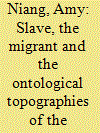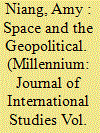| Srl | Item |
| 1 |
ID:
175167


|
|
|
|
|
| Summary/Abstract |
An examination of the figure of the slave and the figure of migrant make visible important historical interconnections that sustain past and present elaborations of the human and ‘the international’. These interconnections have always been racialised and they have structurally constituted the making of an interdependent world community. A series of instrumentalised discourses, at times turned into rationalities that govern policies towards migrants, particularly in a post 9/11 context, increasingly normalises the idea that there are people that can be justifiably expelled from the civic/civil, and increasingly human sphere. The slave was forcefully removed, both physically from attachment to kin and land, and morally from the history of humankind. The migrant is pushed out of the bounds of the livable as well as the moral category of rights-bearer. The commonalities that configure both phenomena are rooted in an extractive supply economy and a hierarchised ordering of humans. The article uses the history of Frederick Douglas to show that the absence of ‘care’ as methodology of relationality limits the valence of interdependence as a marker of a globalised world. In doing so, it challenges the unexamined assumptions of new/posthumanism that advocates radical interdependence without interrogating the modalities of ‘humanity’ among different categories of humans.
|
|
|
|
|
|
|
|
|
|
|
|
|
|
|
|
| 2 |
ID:
192201


|
|
|
|
|
| Summary/Abstract |
The paper argues that the dominant geopolitical analysis draws from a tradition of thought that privileges a geographical approach to space. The process that extends such impetus most compellingly can be found in security intervention. Interventionism, specifically under the War on Terrorism (WoT) thinking projects a cartography of (in)security and threat that disrupts on the one hand existing dynamics of space production and on another redefines space as geography with violent consequences for a variety of life-forms. The question that guides my endeavor is the following: how does a rethinking of the geographical question in international relations (IR), particularly with regards to intervention and the WoT enable us to expand an understanding of geopolitics beyond power struggles over space? Thinking from the Sahel-Sahara region, I wish to offer an alternative view of space where life, government, intellectual representations, commerce, culture, landscape, and belief lead to different kinds of relationships. This view is meant to suggest the beginning of the sketching of different systems of thought and morals through which to apprehend more productively a notion of space in IR.
|
|
|
|
|
|
|
|
|
|
|
|
|
|
|
|